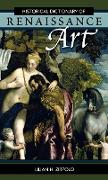Historical Dictionary of Renaissance Art
BücherAngebote / Angebote:
The Renaissance era was launched in Italy and gradually spread to the Netherlands, Germany, Spain, France, and other parts of Europe and the New World, with figures like Robert Campin, Jan van Eyck, Rogier van der Weyden, Albrecht Dürer, and Albrecht Altdorfer. It was the era that produced some of the icons of civilization, including Leonardo da Vinci's Mona Lisa and Last Supper and Michelangelo's Sistine Ceiling, Pietà, and David. Marked as one of the greatest moments in history, the outburst of creativity of the era resulted in the most influential artistic revolution ever to have taken place. The period produced a substantial number of notable masters, among them Caravaggio, Donato Bramante, Donatello, El Greco, Filippo Brunelleschi, Masaccio, Sandro Botticelli, Raphael, Titian, and Tintoretto. The result was an outstanding number of exceptional works of art and architecture that pushed human potential to new heights. The Historical Dictionary of Renaissance Art covers the years 1250 to 1648, the period most disciplines place as the Renaissance Era. A complete portrait of this remarkable period is depicted in this book through a chronology, an introductory essay, a bibliography, and over 500 hundred cross-referenced dictionary entries on major Renaissance painters, sculptors, architects, and patrons, as well as relevant historical figures and events, the foremost artistic centers, schools and periods, major themes and subjects, noteworthy commissions, technical processes, theoretical material, literary and philosophic sources for art, and art historical terminology.
Folgt in ca. 10 Arbeitstagen
